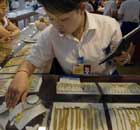Foreign and Military Affairs
China calls for calm as UN meets
By Qin Jize (China Daily)
Updated: 2010-12-20 06:58
 |
Large Medium Small |
BEIJING - As tension on the Korean Peninsula increased ahead of scheduled military drills by the Republic of Korea (ROK), China and Russia urged the two Koreas to show restraint as the UN Security Council held an emergency meeting to discuss the situation late on Sunday.
The session follows a request by Russia after Seoul on Sunday reaffirmed its determination to go ahead with its planned live-fire drills this week off a border island in the Yellow Sea that was shelled last month by the Democratic People's Republic of Korea (DPRK).
He made the comments in a phone call with his Russian counterpart Sergei Lavrov on Saturday night.
Beijing extended its diplomatic efforts to contain the situation over the weekend as two more senior diplomats -- Vice-Foreign Minister Zhang Zhijun and Foreign Ministry spokeswoman Jiang Yu -- made public calls for restraint on Saturday.
Yang warned that the situation on the peninsula remains tense and there is a risk of further escalation.
"China resolutely opposes any action that could inflame tensions and exacerbate the situation, and asks that both sides of the peninsula exercise calm and restraint and open up dialogue and contact," said Yang. He also expressed hope that other relevant parties would do more to ease the situation.
Yang told his Russian counterpart that Beijing would work together with Moscow to "strive to avoid the situation deteriorating out of control".
The ROK had planned to conduct live-fire drills on Dec 18-21 off the island of Yeonpyeong. The drills are similar to ones held last month before the island was shelled by the DPRK and four people were killed.
But the drills were called off on Saturday because of bad weather and ROK authorities vowed to commence them on Monday or Tuesday.
Pyongyang had made it clear during the weekend that the situation on the Korean Peninsula would "explode" if Seoul goes ahead with the plan.
Pyongyang's state media said that its response this time "will be deadlier than what was made on Nov 23 in terms of the powerfulness and sphere of the strike".
The DPRK raised military readiness of its artillery unit along the west coast, Yonhap reported, citing an unidentified ROK government official.
The official said some fighter jets that had been inside the air force hangar in the west coast also came out to the ground.
Vitaly Churkin, Moscow's UN envoy in New York, said he believed that "the Security Council must send a restraining signal to the two Koreas and help launch diplomatic activity with a view to resolving all issues of dispute ... by political and diplomatic means".
Meanwhile, a flurry of regional diplomacy is under way, with Bill Richardson, governor of New Mexico, visiting the DPRK.
Jin Canrong, senior professor with the School of International Studies at Renmin University of China, said he does not pin high hopes on the results of the UN emergency meeting.
After the Nov 23 incident, both Koreas are becoming easily irritated, Jin said.
Beijing is quite worried about the current tension, he added.
He Wei and agencies contributed to this story.












